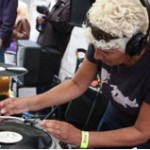
By Sandi Hughes
Sandi Hughes, 67, describes herself as “a nan with a kick” who not only DJs in her hometown of Liverpool, but is on a mission to get more older people online. Here she describes being what she calls a “digi-elder”:
I’m a digi-elder, I use the Internet and am open to new technology – but it doesn’t always go right, like the time I got ‘lost’ on YouTube.
I was in a friend’s kitchen, there were six of us chatting, and my friend told me to get on his computer and find some tunes for us to listen to. I opened YouTube and typed in ‘Missy Elliott’ and everyone made comments on how great the bass sounded and wanted more. When the song finished, I highlighted her next song, and then the next one, and on the next one she sounded a bit different. I clicked on the next one – and realised it wasn’t Missy Elliot singing the song, so I clicked on the next one and each time I clicked on a Missy Elliott song these different girls were singing and the words were getting changed and the visuals were getting more and more raunchy, and my friend said “why are you playing that type of music?” and “what are you listening to – GET IT OFF!” he shouted.
The more I tried to get another Missy Elliott song, the more unclothed the girls were getting and the melody and ambience sounded more like an adult film. My friend shouts “I DON’T WANT THAT FILTH ON MY COMPUTER”, and leans over and flicks the power switch off, creating a blank screen and bringing silence into the kitchen.
As tech-friendly as I think I am, why didn’t I think of doing that?
I first bought myself a Mac when I was 62, to invest in the skills I had learned while using analogue equipment for a video production course. I concentrated on iMovie and iPhoto software which were simple to follow and easy to use. I have yet to play games on my Mac though – my grandson who is 20 has given me his old Nintendo games console…it’s still in my cupboard!
I was DJing for a project called Giants in the Hood which a group of artists from Helsinki held during Liverpool’s 2010 Biennial. I loved it, and had so much fun mixing vinyl and CDs and choosing tunes that kept people dancing for almost two hours. I was aware of how surprised people were at me being able to do this at 67.
Using technology, remembering which button to press can be a problem but regular practice helps. You could say that our memories have always been in analogue, but now our memories have to become digital, so we can remember everything more accurately all the time, because of the way it is fed and kept into computers.
Elders need tailor-made courses on how to get involved and connected to the Internet, support to improve their skills and protection against things like scams, identity theft and fraud.
So many things are digital now; the gas man gets me writing my name with a piece of metal onto a metal box with a plastic screen on it. “It’s called a digital signature,” he tells me. There’s mobile phones, laptops, games, video and stills cameras, Facebook, digital television, online banking – you can pay bills on the internet now, without the need to handle money – you can do your shopping in most places on the net now.
We need to be able to stay connected to our younger generation, with social networking you can keep in touch with your kids, grandkids, mates on Facebook, Twitter, Skype.
With the Internet you can access and share the sense of wonder when you just push a button and enter a place instantly that could be the other side of the world. A lot of us have a passionate desire to always want to know more, and technology and the Internet does this for me. It fulfills my need to push my creative boundaries, offers easy access to information, education, creativity and is a platform for games. It’s hard to loose stuff in a computer.
N u learn nu kwik n e z spellings of sertan wrds specialy in mob fonz n fcbk.
Politicians should pay attention to digital inclusion issues among elders because of the potential that technology and the Internet has to improve life. They could make a real commitment to listening to, valuing and investing in the elders, socially disadvantaged families, and physically challenged people who can’t access it.
There’s a big gulf between those who are ready and have access to computers and the Internet, and those who do not. There are confident users of it and those who are not – but the gap will close when my generation dies, because newer generations will be born into it. Reminds me a bit of the confusion when money changed over to decimal currency in the sixties!
Internet access should be a human right. I’d like to see free broadband for pensioners, or at least a subsidised package. It’s the future – but not as we all know it, so you need to get to know it!
